Interview with John Coviello from Little Shop of Magic
CG: What’s your internet discount matching policy?
LSoM: It’s actually on the website, you can look it up at any time you want. If you’re shopping online and you can find an equally matched item, we’ll price match it for you. We don’t match clearance prices and out of stock items, or eBay prices. If it’s got 7 days to go, I can’t match something when I don’t know what the end result will be.
Store Background, Gaming Background, Success, and Work Ethic
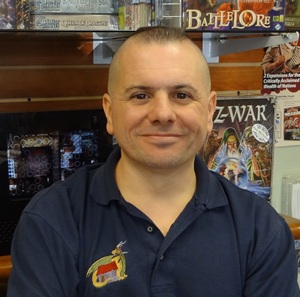 CG: How did you start back in Flagstaff?
CG: How did you start back in Flagstaff?
LSoM: Pure accident. At the time I’d just gotten out of the Marine Corps, I was going to college, majoring in Public Relations with a minor in Computer Science and I was working for Hasting, a books, music, and video store. It was a chain of 108 stores and I was an assistant manager there and a game buyer. I got a call from one of the distributors, Wargames West Central-
CG: In New Mexico?
LSoM: In New Mexico, Wayne Godfrey, yeah, he eventually sold the store…So I got a call from them, “There’s this new game called Magic. Do you want to try it?” So I literally bought two decks.
CG: And these were just the starter decks, right?
LSoM: These were the Alpha starter decks. We playtested it, we liked it. So Magic exploded. I got tired of it within three weeks. Not my cup of tea in general, CCGs. But I liked the artwork so I collected card sets as they were coming out, so if you’re familiar with Magic you know how prices skyrocketed. So I got to the point where I was looking to sell them at a convention, in either Tucson or Phoenix, to see if we could get rid of our extra cards. We had a great selling weeekend. I decided against doing the typical college thing of dumping it in beer, but approached a friend of ours instead who had a small 300 foot sq. store they were selling comics out of, the Comics Co-Op. This was September of ’94.
CG: Are they still in business?
LSoM: No.
CG: How big is your store now?
LSoM: This is a little over 3,000 sq. feet. We entered an agreement where it was you guys sell comics, we sell games, we split rent. It worked out for them, because they had extra people to man the store, we didn’t have to take on the lease, it kind of skyrocketed from there. We expanded the store twice in that location. We moved the store twice in Flagstaff to get to bigger and bigger locations.
CG: What about before? How did you get interested in games in the first place?
LSoM: I was 8 years old and I walked into a bookstore and they had a series of games from Avalon Hill, the bookshelf games, they had Starship Trooprs and I took that home.
CG: With chits?
LSoM: Yep, cardboard chit counters. If you know Avalon Hill, Avalon Hill and 8 year olds don’t mix well. I went over the game’s rules for like 10 days, but I was determined to find a game I could understand and went back the following week: a counter spinner rack of some of the first licensed D&D miniatures caught my eye, so I bought the Red Box, and dove in. That was the first game I got into, got into. I finally got to play the game [Avalon Hill’s Starship Troopers] when I was 16, it sat on my shelf for 8 years. I started playing D&D with my brother first and my friends, etc. etc.
If you know Avalon Hill, Avalon Hill and 8 year olds don’t mix well.
CG: Are you more of a DM or a player?
LSoM: I was always the DM. At the time I was living in Italy and coming to the States in the summer. Back in the 80s you couldn’t find anything for D&D in Italian. Everything was in English. So I had to read the books and DM. [John explains that he was born in New York, but grew up in Italy.]
CG: You speak Italian fluently?
LSoM: Yes. And I’ve lost most of my French and I used to speak that very well too.
CG: Do you still play Magic: TG at all?
LSoM: No. I haven’t played Magic for years. Absolutely nothing wrong with the game. I like miniatures. I like more tactile experiences than just cards.
CG: What do you think of the 3 expansions a year? Should there be more? Less?
LSoM:It seems to be more than that. The core set breaks that pattern. There’s one that comes out in May, the core set in July,… so you have effectively have 4 expansions a year. What do I think about them? It seems that the die hards keep up with that pace. Magic has been growing a lot and staying steady, so I imagine that it’s the right pace.
CG:How is Las Vegas different from Flagstaff in terms of gaming?
LSoM:I’m not going to say variety. I would say just the sheer playerbase is bigger. And Vegas, maybe it is because of the larger amount of players, but it’s a lot more political and fragmented.
CG: In terms of who’s playing where?
LSoM: Not necessarily, but rivalries, my game is better than yours, that situation. I think some people are more into gaming for the ego boost that it gives them than the gaming experience itself. So and so is the guy that I follow… I play what he plays.
CG: Living in Las Vegas, I know Little Shop is very brick and mortar, but is a decent part of your business in internet sales?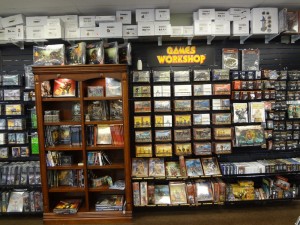
LSoM: We do both, yeah. We’ve been able to successfully marry the two. Brick and mortar in 1994 and the internet store in 1996. The reality of it is that the majority of my expenses come from my brick and mortar, however the reason why I never went exclusively online is that there’d be no hobby in 20-30 years. The problem with internet sales is that they cater to a vested audience, people already engaged in the hobby, and they do very little to promote the hobby to a brand new audience. As much as we think Magic is huge or Settles or Cataan, it’s still a tiny, tiny segment of the population. Part of the job of a good brick and mortar store is constantly bringing people into the fold and expanding our industry.
CG: How do you do that?
LSoM: Organized play, providing a friendly atmosphere and a professional atmosphere. Basically treating our store like a store and not a club house.
CG: Yeah, one of the questions I was going to ask was how you explain your success and longevity.
LSoM: Honestly that’s the big thing. Treating the business like a business. It’s unfortunate that those are the harsh realities of our business. It is a business. We have to pay our rent every motnh, our employees every week. A lot of people who get into this line of work, do so because it is their hobby. The problem is that once you’re in this line of work, it’s not a hobby, it’s your job.
CG: How many hours do YOU work each week?
LSoM: It’s better now, but typically 40-60, make that 50-60 actually.
CG: How many hours are you open each week?
LSoM: [John does some calculations] …78 hours.
Retail Duds
CG: What are some of the real retail duds of the last 3-5 years?
LSoM: That’s very subjective, I’m going to start with prefacing it with if I can’t sell it, it doesn’t mean someone else can’t. I’ve seen shifts in a matter of miles between what sells and what doesn’t. Let’s say I don’t sell Heroclix well, it doesn’t mean that a comic book store won’t sell it well, so I can give you MY duds. One that I passed up on and I’m very glad I did is called Redaki, it’s based on a Japanese cartoon. I passed on it for a number of reasons. One, it was already competing in a crowded field. Two the product released before the cartoon did in the United States. It was a high price point for a low number of cards. And sort of the final straw for me, was the very low margin point. It wasn’t anywhere near the standard of our industry.
CG: Was that a gaff on the part of the company that made it?
LSoM: No. They chose to use this lenticular card format, that has this kind of really cool 3D animation. That was part of the mechanics of the game, that you put them on top of each other and you could actually see the attack. It’s like a holograph. 4-5 cards for $5.
CG: What are some other ones?
LSoM: Another one that I unfortunately didn’t see was, let me go see, let me look at the product, because I have a couple left. Arcane Legions
CG: Ah.
LSoM: Yep. So on paper the concept was good. It was a bridge game: in other words, it was a way to bring non-miniature gamers on board as miniature gamers. Unfortunately it didn’t catch on with non-miniature gamers or miniature gamers either. The miniatures weren’t cool enough to attract existing miniature gamers. and the mechanics weren’t enough to capture non-miniature gamers.
CG: So you made that choice as a buyer, I don’t want to stock that.
LSoM: I make that choice everyday. This is something that we get, and we get one from each of the distributors. [John leafs through a copy of GTM, Game Trade Magazine.]
CG: Oh, like Alliance.
LSoM: Every day I probably get 15-20 emails for product solicitations.
CG: Those are sales staff approaching you?
LSoM: Yes. It can come from a manufacturer level, a distributor level, lately it’s even been from people who are starting from Kickstarter.
CG: They’re asking you to put money in?
LSoM: Yes.
CG: Have you?
LSoM: Nope.
CG: Are you aware of any that have succeeded with Kickstarter?
LSoM: Yeah. Did you get your thing published? Sure, are you making money hand over fist, not that I’ve seen.
Area 51 Miniatures
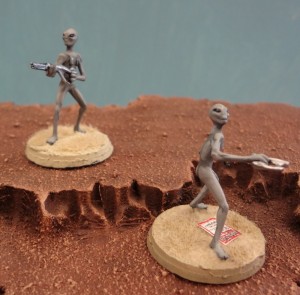 CG: Now what about your Area 51 Miniatures?
CG: Now what about your Area 51 Miniatures?
LSoM: It met my expectations. I knew going into it, that I’d not become the next Games Workshop nor did I plan to do so. I just wanted to try my hand at being a manufacturer. In that respect it was successful, I’ve recouped my costs, it was fun to do. And now we are in the profit phase, where I don’t have to put any money into it. Every time we sell a miniature we make a profit.
CG: Who uses them?
LSoM: They’re generic for any system you want to use. We were approached by Ed [Teixera], the TwoHourWargames guy, we told him go ahead, he has a set of sci-fi rules. And also Monomer Games, a local company, has a PDF to use them in their Zombie a-Go-Go game.
CG: Any further plans with that?
LSoM: Not particularly, again it was a project that started off with a bunch of friends. Unlike me, they’re not directly involved in the industry as their source of income. They do the sculpting, I do the marketing. So if time comes up we’ll release more models, if it doesn’t, it doesn’t.
Board Game Rental Program
CG: What is your board game rental program and where’d the idea come from?
LSoM: The board game rental program kind of came from trying to figure out how to best use our demo copies of games. The basic fundamental problem with it is we can’t, at a moment’s notice, run a demo. We have to process mail order transactions, that’s our receiving crew usually, find items for people, pay bills, etc., etc. We can’t at a moment’s notice, run a demo.The problem is that when we schedule a demo, we can generate excitement for a game, then the demo copy serves its purposes. We can’t physically afford to have staff manning demo copies.
The other problem is that when you look at board games, they have an average price point of 40-50 dollars, that’s fairly typical, so while we can give a recommendation to a customer, he is ultimately the best judge of whether he’s going to like that game or not. So the rental program let’s you check it and if you love it, we’ll take that rental purchase and apply it to the game. So it’s literally a test drive program. Basically the customer doesn’t have to take my word for it, he can try it himself, great, he likes it. Liking or not liking something is very subjective. I can tell you why I like a game, and you can agree with me that you like bidding mechanics which that game has, but if you don’t like bidding mechanics, you will hate it.
CG: How long are the rentals for?
LSoM: We charge by day. Ultimately speaking, yeah, make a decision, otherwise you bought yourself that game.
Gaming Store Profits
CG: Where do actual profits come from in running a gaming store? Is it special CCG events? Christmas sales?
LSoM: There’s different ways of running it. We, as a general policy for the store, don’t aim to make money for events. The main reason for us to have a gaming area and a floor space is to generate excitement for gaming, not to make money on the game itself. That doesn’t mean that that’s a bad way of doing business; there’s plenty of successful stores that use events as revenue generators. But as far as our store is concerned, we generate revenue when we sell a product.
CG: Well, which sort of products make the most profit?
LSoM: It’s kind of split evenly. I would say that there’s four big broad categories or departments: miniature games, collectible card games, board games (which currently encompasses the deck bulding games, Dominion, the Lord of the Rings one, the Game of Thrones one, you can buy expansions), and finally role playing games.
CG: And where in there do you make the most money?
LSoM: It’s split evenly across the board except roleplaying games are chronically underperforming. That’s been the case for going on 8 or 9 years now.
CG: Is part of that, Barnes and Noble having stuff?
LSoM: No. There are some inherent problems with the ways that RPGs work from a profit point of view. The basic fundamental problem is you have one buyer and five to six players. Usually the DM saddles the majority of the book purchases and the modules and the players buy a set of dice, a pencil, maybe a miniature. Problem number two, however morally you feel about it: the illegal aspect of downloading PDFs. I’m not talking about legitimately doing it, I’m talking about photocopying or doing a torrent rather than purchasing it. And then finally the mindset that I don’t ever want to buy a new book ever again. We see this whenever a new edition of a roleplaying game comes out. It’s been eight years since the last one, but they’re outraged at the idea.
CG: Do you think that GW has conditioned wargamers to just accept it?
LSoM: I don’t know what it is with miniatures, but miniature players are a more steady purchasing group.
CG: Could it be in for a penny in for a pound?
LSoM: I think there’s always something coming out where you can justify to yourself I really want that model. As an example, I haven’t played 40k in a while, but I just bought the new Tyranids because they look awesome. I don’t know if I’ll put them together or get in a game of 40k this year, but I still purchased them. There’s definitely some companies that work the fanboy aspect well. They know how to keep their customers engaged.
“I read the book, because I got the game, because I wanted to know more about the background of the game.”
CG: So what looked cool to you?
LSoM: On Tyranids, I always like the big alien bug cold, unfeeling aspect of them, the hive mind, so I just really like the way those look.
CG: Did you get the Tervigon or whatever it’s called?
LSoM:The Tervigon and the new Hive Tyrant…
CG: So you got both of those.
LSoM: Yep, I skipped a generation, I never did the newer Hive Tyrant, the metal one.
CG: What did you play in Starship Troopers?
LSoM: Yeah, that game wasn’t around for long. I played both sides.
CG: Oh, I meant the Avalon Hill one, not Mongoose’s.
LSoM: Haha, yeah, I played all three sides, because you also had the Skinnies.
CG: Did you read the books?
LSoM: Yeah! Incidentally I read the book, because I got the game, because I wanted to know more about the background of the game.
Other Trends and Games Workshop
CG: What other trends have you noticed in the last ten years in gaming?
LSoM: The big one right now is what we were talking about with constructible deck games. It started with Dominion and now you have a whole subcategory of games, that are basically CCGs without the collectible aspect. On the miniatures side, we’ve seen a lot more variety come out that’s actually able to stick around.
CG: Like Malifaux?
LSoM: Malifaux’s one, Dystopian Wars, Warmachine and Hordes, Flames of War, there was a time around 2002 around 2005 where if it wasn’t GW, nobody was carrying it, nobody was selling it, nobody was playing it.
CG: So you’ve resisted becoming a GW store and carrying the full line and all of that?
LSoM: I am. I am actually a Partner level store. But did I resist it? Yeah, for a long period of time, because of what their impositions are, it wasn’t beneficial for my business, to abide by those guidelines to achieve that Rogue Trader store. Now it’s called a Partner level store, but same position? Yes. To give you an example, when we were in Flagsatff we only had one Ork player, when the new Ork General came out, I could not order two Ork Generals, I’d have to order six or nothing, because that’s how they were packaged in the warehouse.
CG: So you didn’t order or what?
LSoM: Only if the customer really wanted it. So then I’d get stuck with the other five.
CG: And then sell it online…
LSoM: You can’t.
CG: And why’s that?
LSoM: If you’re a Partner level store you agree to not sell their product online. Somebody calls me and wants to order something, fine, But I can’t have an online shopping cart with their products.
CG: How much are you concerned about Games Workshop doing as it has done and maybe is still doing in opening up a store in the area where a lot of its product is being sold?
LSoM: I am not concerned. I understand that that’s how it works. But realistically speaking, the way things work in my store, if people buy something, I stock it, if they don’t buy something, I stop stocking it. I know several retailer friends who have GW stores in their market area, I have one who has three [stores], yet they still sell a lot of GW product. At the basic level, a GW store is just like any other store, I mean in this town, you have five stores carrying GW, a sixth one makes no different in the grander scheme.
CG: I think the sixth matters to some of the other businesses, probably not as much to Little Shop.
LSoM: But that’s not a factor of GW, that’s a factor of that business. Can you blame the competitor for that? When you look at a GW store, what does it have that another store can’t have? The only thing that they have the advantage on me, is I cannot give you the cool Space Wolf keychain. That might be a motivation for someone to go down to the store to get that keychain. As a matter of fact, a regular GW store doesn’t stock the full line of GW items. So, Forgeworld stuff, Collector’s, the online only orders.
I’m gonna give you the opposite, that a GW store can be beneficial. It’s inevitable for one to come here if we grow the GW market enough. I’m surprised that there’s not one here already. That being said, what GW stores excel at is recruiting new players. What GW stores don’t do well at is sustaining that playerbase. And that’s where usually Battle Bunkers or independent stores like this one, come into play. You’re not going to find room for 34 players in a GW store, unless you’re in a Battle Bunker, and they’re few and far between and all they can push is GW product.
Being a Dedicated Game Store
CG: I know you shared that space with the comic book shop, but have you ever thought of selling comics too?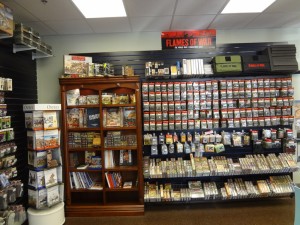
LSoM: We actually did it for a couple of years when the Comic Co-Op closed shop. A few of their members graduated college, moved on with their lives, etc. We were the only store in Flagstaff providing comics. So for about two years we did comics. Frankly, not my personal interest so I don’t do comics well myself. So when another comic book store opened up in town, we gladly said go get your comics over there. On a personal level, I feel that by being a dedicated game store I can specialize in games and provider a greater depth of service than I would by diversifying my interest. I know some retailers in smaller towns, who literally are a game store, a comic book store, a used video game store, a used music store, etc. etc. I’ve been exclusively games for a long long time and it’s paying the bills, and I’m happy with it. I want to say it was 2000, 20001 when I went completely games.
CG: So it’s because you wouldn’t know enough about the comics because you don’t keep up with them?
LSoM: I do enjoy comics. I love the Walking Dead. But that’s it. I’m done. I’m not a huge superhero fan. I followed Spawn for a while. I don’t have the passion that it would take to be a good comic book store for my customers.
CG: Well, you seem to be able to direct gamers because you know the games so well.
LSoM: I should be able to peg it out for you. If not, I should be able to find it out. I don’t always happen to know about a particular product. Nor can all my associates. We all have our areas of expertise. If we were to talk about historical miniatures, myself or Nile would be your person. Anyone of my associates know who to address the question to or they have the resources to gather that information for you. I have actually been able to have the luxury of being able to go on vacation last year. For 10 days I was unreachable. I have to make sure that these guys can take care of my customers even when they can’t reach me.
CG: Where’d you go?
LSoM: Mexico: Cabo San Lucas, Puerto Vallarte, and a couple of other small places that I can’t remember.
CG: At the same time, I’ve walked through the door a number of times and you’re the only one there.
LSoM: Yeah, sure. For a number of reasons. If the flow of business doesn’t justify extra staff, there’s no point in it, I will be the only person that puts myself in that situation, these guys, there’ll usually be two staff any point in time. And the final reason is, as the business owner, I will sacrifice myself if one of the guys needs the day off, if someone wants to go to a concert, etc. etc.
The PGSA
CG: What can you tell me about the PGSA?
LSoM: Basically it’s a trade organization whose chief goal is to assist gaming industry retailers into improving their bottom line and to provide a more professional environment.
CG: How many members are there?
LSoM: I don’t know right now. It’s somewhere about 100. Last count about 100. It was started a year and half ago.
CG: Do you have a newsletter?
LSoM: No. We do have an informational website that has articles, progamestores.org.
CG: Now is that something that I or anyone else can read?
LSoM: Yeah.
CG: Thanks!
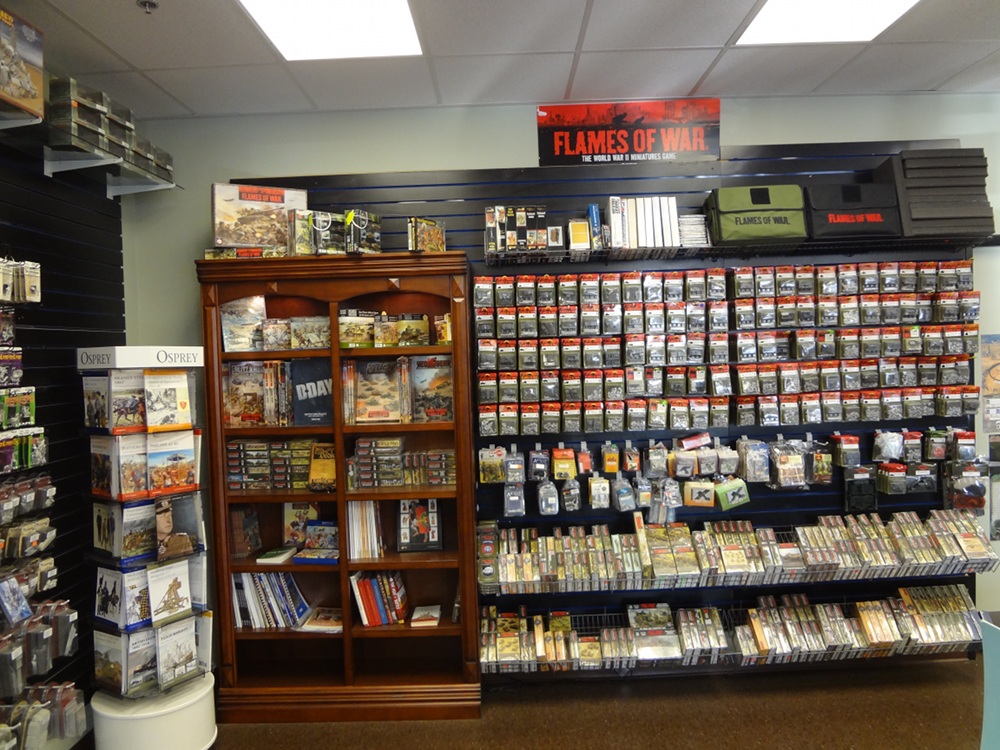
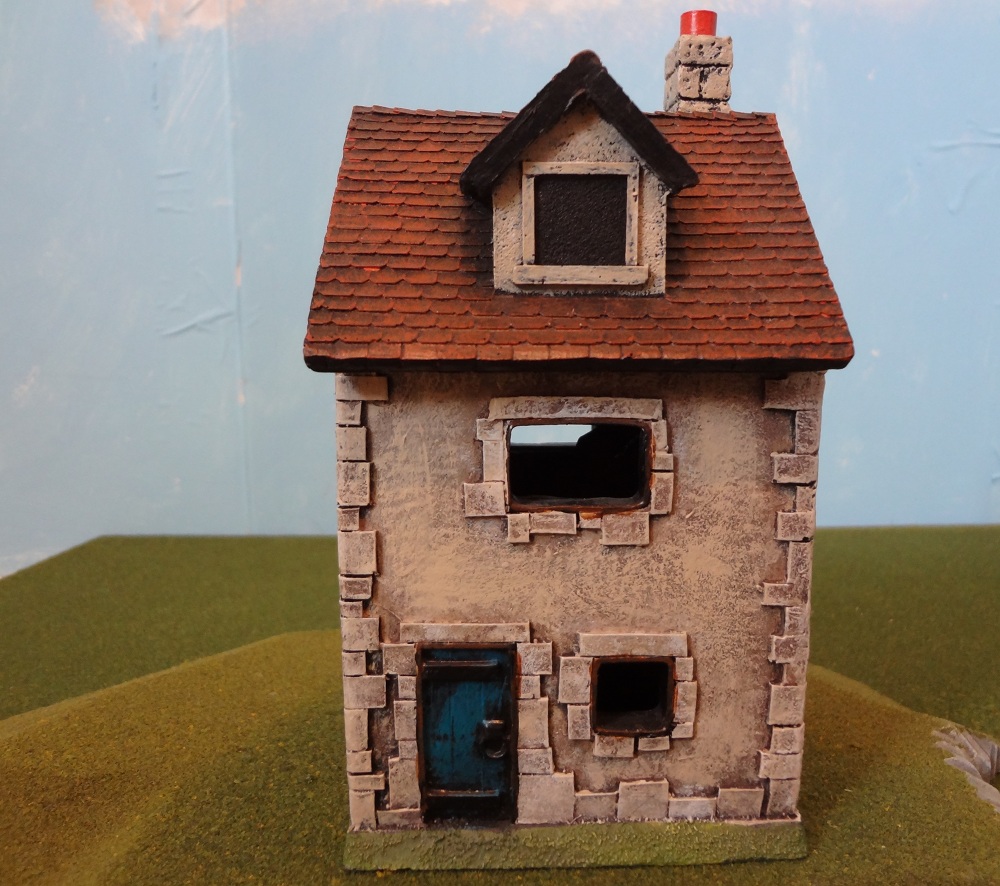
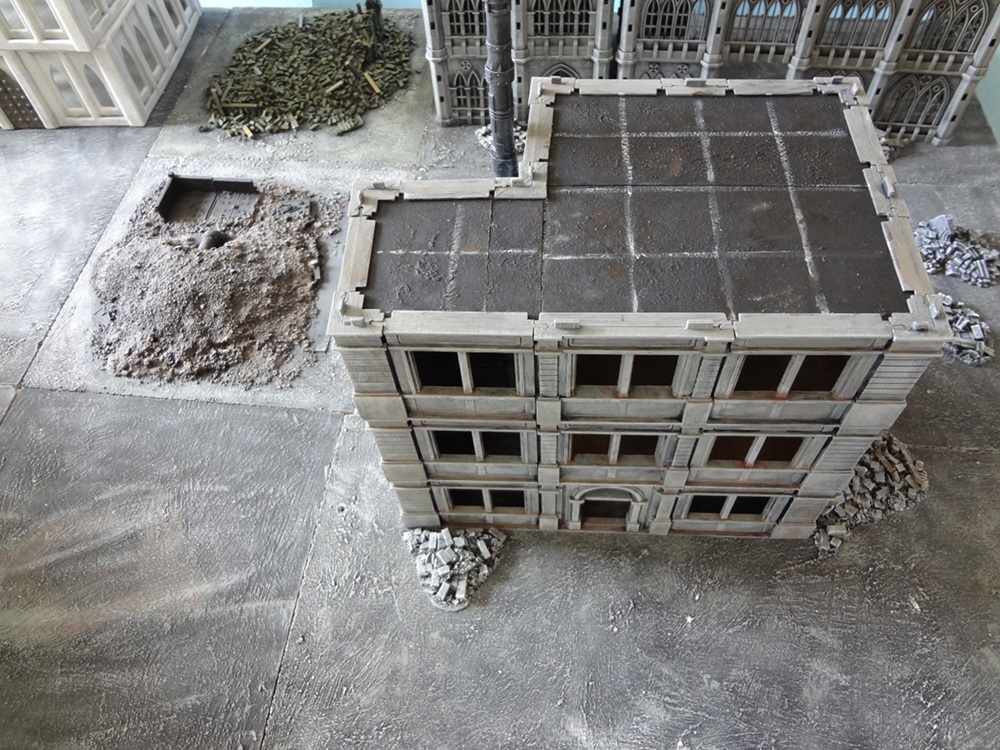
Pingback:Kicking Off Kaijudo’s Quest for the Gauntlet with Drew Nolosco | Craven Games: In-Depth Tabletop Games and LARPing Coverage